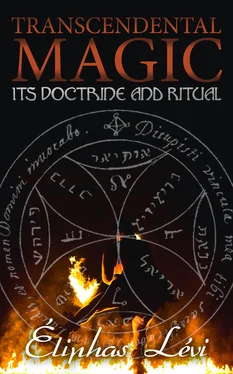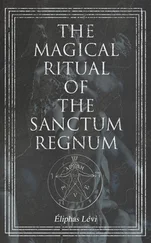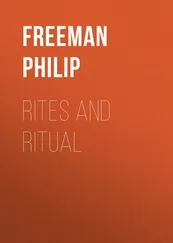We have sketched rapidly the history of occult philosophy; we have indicated its sources and analysed in a few words its chief memorials. The present division of our work refers only to the science, but Magic, or rather magical power, comprehends two things, a science and a force: without the force the science is nothing, or rather it is a danger. To give knowledge to power alone, such is the supreme law of initiations. Hence did the Great Revealer say: `The kingdom of heaven suffereth violence, and the violent only shall carry it away.' The door of truth is closed, like the sanctuary of a virgin: he must be a man who would enter.
All miracles are promised to faith, and what is faith except the audacity of will which does not hesitate in the darkness, but advances towards the light in spite of all ordeals, and surmounting all obstacles? It is unnecessary to repeat here the history of ancient initiations: the more dangerous and terrible they were, the greater was their efficacy. Hence, in those days, the world had men to govern and instruct it. The Sacerdotal Art and the Royal Art consisted above all in ordeals of courage, discretion and will. It was a novitiate similar to that of those priests who, under the name of Jesuits, are so unpopular at the present day, but would govern the world notwithstanding, had they a truly wise and intelligent chief.
After passing our life in the search for the Absolute in religion, science and justice; after revolving in the circle of Faust, we have reached the primal doctrine and the first book of humanity. At this point we pause, having discovered the secret of human omnipotence and indefinite progress, the key of all symbolisms, the first and final doctrine: we have come to understand what was meant by that expression so often made use of in the Gospel – the Kingdom of God.
To provide a fixed point as a fulcrum for human activity is to solve the problem of Archimedes, by realizing the use of his famous lever. This it is which was accomplished by the great initiators who have electrified the world, and they could not have done so except by means of the Great and Incommunicable Secret.
However, as a guarantee of its renewed youth, the symbolical phoenix never reappeared before the eyes of the world without having consumed solemnly the remains and evidences of its previous life. So also Moses saw to it that all those who had known Egypt and her mysteries should end their life in the desert; at Ephesus St. Paul burnt all books which treated of the occult sciences; and in fine, the French Revolution, daughter of the great Johannite Orient and the ashes of the Templars, spoliated the churches and blasphemed the allegories of the Divine Cultus. But all doctrines and all revivals proscribe Magic and condemn its mysteries to the flames and to oblivion. The reason is that each religion or philosophy which comes into the world is a Benjamin of humanity and insures its own life by destroying its mother. It is because the symbolical serpent turns ever devouring its own tail; it is because, as essential condition of existence, a void is necessary to every plenitude, space for every dimension, an affirmation for each negation: herein is the eternal realization of the phoenix allegory.
Two illustrious scholars have preceded me along the path that I am travelling, but they have, so to speak, spent the dark night therein. I refer to Volney and Dupuis, to Dupuis above all, whose immense erudition produced only a negative work, for in the origin of all religions he saw nothing but astronomy, taking thus the symbolic cycle for doctrine and the calendar for legend. He was deficient in one branch of knowledge, that of true Magic which comprises the secrets of the Kabalah. Dupuis passed through the antique sanctuaries, like the prophet Ezekiel over the plain strewn with bones, and only understood death, for want of that word which collects the virtue of the four winds and can make a living people of all the vast ossuary, by crying to the ancient symbols: ‘Arise! Take up a new form and walk!’ But the hour has come when we must have the courage to attempt what no one has dared to perform previously. Like Julian, we would rebuild the temple, and in so doing we do not believe that we shall be belying a wisdom that we venerate, which also Julian would himself have been worthy to adore, had the rancorous and fanatical doctors of his period permitted him to understand it. For us the Temple has two Pillars, on one of which Christianity has inscribed its name. We have therefore no wish to attack Christianity: far from it, we seek to explain and accomplish it. Intelligence and will have exercised alternately their power in the world; religion and philosophy are still at war with one another, but they must end in agreement. The provisional object of Christianity was to establish, by obedience and faith, a supernatural or religious equality among men, to immobilize intelligence by faith, so as to provide a fulcrum for virtue which came for the destruction of the aristocracy of science, or rather to replace that aristocracy, then already destroyed. Philosophy, on the contrary, has laboured to bring back men by liberty and reason to natural inequality, and to substitute wits for virtue by inaugurating the reign of industry. Neither of these operations has proved complete or adequate; neither has brought men to perfection and felicity.
That which is now dreamed, almost without daring to hope for it, is an alliance between the two forces so long regarded as contrary, and there is good ground for desiring it, seeing that these two great powers of the human soul are no more opposed to one another than is the sex of man opposed to that of woman.
Undoubtedly they differ, but their apparently contrary dispositions come only from their aptitude to meet and unite.
“No less is proposed, therefore, than a universal solution of all problems?”
The answer is yes, unquestionably, since we are concerned with explaining the Philosophical Stone, perpetual motion, the secret of the Great Work and of the Universal Medicine. We shall be accused of insanity, like the divine Paracelsus, or of charlatanism, like the great and unfortunate Agrippa. If the pyre of Urban Grandier be extinguished, the sullen proscriptions of silence and of calumny remain., We do not defy but are resigned to them. We have not sought the publication of this book of our own will, and we believe that if the time be come to bear witness, it will be borne by us or by others. We shall therefore remain calm and shall wait.
Our work is in two parts: in the one we establish the kabalistic and magical doctrine in its entirety; the other is consecrated to the cultus, that is, to Ceremonial Magic. The one is that which the ancient sages termed the Clavicle, the other that which people on the country-side still call the Grimoire. The numbers and subjects of the chapters which correspond in both parts, are in no sense arbitrary, and are all indicated in the great universal key, of which we give for the first time a complete and adequate explanation. Let this work now go its way where it will and become what Providence determines; it is finished, and we believe it to be enduring, because it is strong, like all that is reasonable and conscientious.
ELIPHAS LEVI.
I  A
A
Table of Contents
DISCIPLINA ENSOPH KETHERI
WHEN a philosopher adopted as the basis for a new apocalypse of human wisdom the axiom: “I think, therefore I am”, in a measure he altered unconsciously, from the standpoint of Christian Revelation, the old conception of the Supreme Being. I am that I am, said the Being of beings of Moses. I am he who thinks, says the man of Descartes, and to think being to speak inwardly, such a one may affirm, like the God of St. John the Evangelist: I am he in whom and by whom the word manifests – In principio eras verbum. Now, what is this principle? It is a groundwork of speech, it is a reason for the existence of the word. The essence of the word is in the principle; the principle is that which is; intelligence is a principle which speaks. What further is intellectual light? It is speech. What is revelation? It is speech also, being is the principle, speech is the means, and the plenitude or development and perfection of being is the end. To speak is to create. But to say: “I think, therefore I exist”, is to argue from consequence to principle, and certain contradictions which have been adduced by a great writer, Lamennais, have proved abundantly the philosophical unsoundness of this method. I am, therefore something exists might seem to be a more primitive and simple foundation for experimental philosophy. I AM, THEREFORE BEING EXISTS. Ego sum qui sum, such is the first revelation of God in man and of man in the world, while it is also the first axiom of occult philosophy.  Being is being. Hence this philosophy, having that which is for its principle, can be in no sense hypothesis or guess-work.
Being is being. Hence this philosophy, having that which is for its principle, can be in no sense hypothesis or guess-work.
Читать дальше

 A
A Being is being. Hence this philosophy, having that which is for its principle, can be in no sense hypothesis or guess-work.
Being is being. Hence this philosophy, having that which is for its principle, can be in no sense hypothesis or guess-work.










